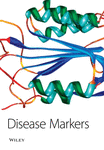CD14CD16 Monocyte Subset Levels in Heart Failure Patients
Abstract
Our aim was to define the distribution of monocyte subsets in a cohort of congestive heart failure (CHF) patients, to verify whether increased severity of CHF is linked to the expansion of specific monocyte subsets, and finally to investigate the relationship between monocyte subset relative frequencies, laboratory parameters of inflammation, and monocyte ACE expression.
Thirty consecutive CHF patients and 26 healthy control subjects were evaluated for peripheral blood monocyte expression of CD14, CD16 and CD143 (ACE) by flow-cytometry, and for endothelial-derived soluble CD146 levels by ELISA.
CD14++CD16+ frequency was significantly higher in CHF patients than in Controls (%, median value and IQ) (12.3, 8.7–14.8 vs 5.9, 4.7–6.9, p++CD16+ levels. Frequencies of CD14+CD16+ monocytes were significantly lower in CHF patients as compared to Controls, and negatively correlated with levels of soluble CD146 (r = −0.529; p 0.048).
In conclusion, monocytic CD14++CD16+ frequency and CD143 levels are increased and reflect disease status and progressive cardiac deterioration in CHF patients. The CD14+CD16+ subset is depleted in CHF and is linked to endothelial damage in this group of patients.
Although the question of whether differences in monocyte CD14CD16 expansion are causal or whether they represent a marker of HF progression which is potentially relevant for risk prediction remains unanswered, we believe that our data represent an important tool for exploring the role of selective inflammatory pathways in CHF progression.




